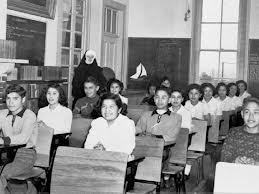By Ray Rivers
BURLINGTON, ON. Over a decade ago, Newfoundland and Quebec, the most Catholic provinces in Canada, moved to a single public education system and eliminated separate school funding, leaving only Alberta, Saskatchewan, Yukon and Ontario in the dark ages.
The UN human rights commission has weighed-in, as well, determining that Ontario is discriminating against other religions and demanding either an end to separate school funding or that the province publicly fund all other religious schools. We may recall from the election of 2007 how Ontario voters overwhelmingly rejected the full-funding option advanced by Tory leader John Tory.
It’s true that there are constitutional guaranties for separate schools in Canada, a legacy of provincial deal-making in the days leading to the formation of the nation. But the provinces have absolute authority over education and Ontario could reduce its sprawling systems of education, 73 in total, with the stroke of pen, as Manitoba, Quebec and Newfoundland have done. There are 29 English Catholic, 8 French Catholic, one Protestant, (Penetanguishene) 31 English public and 4 French public school boards that operate in Ontario, more than twice as many as would be needed for a secular-only public school system.
The Manitoba Act creating that province in 1870, included a provision for a separate school system. Manitoba’s history is intensely complicated but this issue, became one of the biggest in the province’s history and one which nearly tore the new nation apart. However, Manitoba persisted in its efforts to eliminate funding for separate schools and two years after Manitoba the North-West Territories essentially followed suit. More people in Quebec (over 80%) identify as Catholic than in any other province, yet the province also decided to abandon public funding for the Catholic education system and received constitutional authority to proceed in in the late 1990’s.

Solid Catholic classrooms were once a part of Newfoundland educational system. That province is now totally integrated.
I have been visiting the Rock this week. It’s earliest residents included the Beothuk aboriginal people (now extinct), and the Vikings. Newfoundland was accidentally discovered by a Portuguese fisherman, landing some twenty years ahead of Columbus. The Rock was later re-discovered and its modern history started with John Cabot and English and French settlers before being invaded by Irish immigrants seeking relief from their potato famine and English oppression. By 1840 Irish Catholics made up half the population of the Island, but it was closer to the turn of that century that formal education was initiated with the Anglicans, Methodists and Catholics each running their own religious schools.
As Newfoundland joined Canada in 1949, the protestant schools evolved into a secular public school system but under terms of joining the confederation, Catholic schools had also been given funding. It took a half-century and two referenda for Liberal Premier Brian Tobin to eliminate funding for all but the secular public system. So only the provinces of Alberta, Saskatchewan and Ontario still fund Catholic schools.
 Dalton McGuinty’s government transformed Ontario’s education system from one of the worst to the very best in Canada over his time in office, but was somehow uninterested in further cutting costs by reducing duplication among school boards. Even as he charged the Drummond Commission to explore ways of reducing duplication and eliminating the deficit, he and they left the secular public schooling option on the table.
Dalton McGuinty’s government transformed Ontario’s education system from one of the worst to the very best in Canada over his time in office, but was somehow uninterested in further cutting costs by reducing duplication among school boards. Even as he charged the Drummond Commission to explore ways of reducing duplication and eliminating the deficit, he and they left the secular public schooling option on the table.
After health, education is the largest expenditure for the provincial government, so it is perhaps unsurprising that Drummond’s report can be found mostly on a shelf gathering dust. Now Dalton has left the room leaving a new Ontario premier to chart a new course, including doing something serious about the province’s expenditures and deficit. And what could be easier than eliminating this remaining anachronistic vestige of post colonial rule, amalgamating the various school boards and shutting down those redundant to the educational needs of the province?
When I lived in rural Ottawa, years ago, I used to watch four half-empty buses from four different school boards parade one after each other, and wonder. I haven’t seen the math on this, don’t have the numbers, but moving to a single school system should be a win-win for the people of Ontario just as it has been for Newfoundland, and Quebec. And speaking of Quebec, the irony of it all is that funding for separate schools was only ever put in the constitution because of the insistence of Quebec. And that province has now eliminated it’s own separate school system.
 Ray Rivers was born in Ontario; earned an economics degree at the University of Western Ontario and earned a Master’s degree in economics at the University of Ottawa. His 25 year stint with the federal government included time with Environment, Fisheries and Oceans, Agriculture and the Post office. He completed his first historical novel The End of September in 2012. Rivers is active in his community. He has run for municipal and provincial government offices and held executive positions with Liberal Party riding associations. He developed the current policy process for the Ontario Liberal Party.
Ray Rivers was born in Ontario; earned an economics degree at the University of Western Ontario and earned a Master’s degree in economics at the University of Ottawa. His 25 year stint with the federal government included time with Environment, Fisheries and Oceans, Agriculture and the Post office. He completed his first historical novel The End of September in 2012. Rivers is active in his community. He has run for municipal and provincial government offices and held executive positions with Liberal Party riding associations. He developed the current policy process for the Ontario Liberal Party.





















Perhaps Mr Tory would be a good person to ask if we should merge school boards.
Bigger is not always better. One only has to look at the experience of amalgamation in the City of Toronto; other than Fire & Library services (that were working together before the merger) Toronto still has major problems as a result of the Mega City.
Full disclosure, I’m a separate school supporter, I think there are savings to be had by boards co-operating just as there are savings that can be had by Boards of Education working more closely with Municipalities. The system we have can be refined but wasting energy fighting this battle is in no one’s interest.